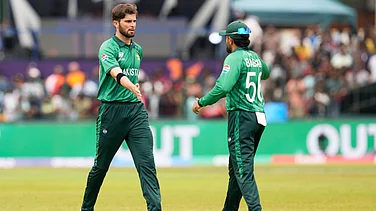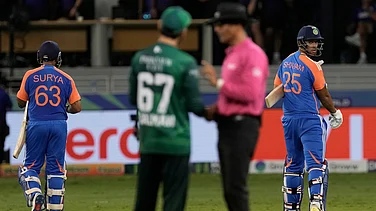As the former Proteas captain retraced his steps through the dark alleys of the betting world during his cross-examination, which entered its third day on June 23, the event offered moments that were in part tantalising, incredulous and even funny. Hansie Cronje's half-way 'exoneration' of Mohammed Azharuddin and refusal to drag in former team-members. Accounts of "money for jam" pouring in from places even Cronje didn't know about. And the shadowy figure of the mysterious Johannesburg businessman, Hamid 'Banjo' Cassim, who lurked as a major liaison between the disgraced cricketing hero and international bookies.
Cassim has been identified as the man who initially approached Cronje with an offer to assist bookies in connection with the January 2000 triangular series between South Africa, England and Zimbabwe. Some commentators fear Cassim could well be connected to a much wider network of officials and bookies from all over the cricketing world, particularly London-based Sanjay Chawla.
Although Cassim has not yet been summoned for a deposition before the King Commission, his lawyer, Itzie Blumberg, wrote to the United Cricket Board of South Africa (ucbsa): "I want to place it on record that my client is prepared to offer full assistance to the authorities in regard to the inquiry or any other authority that will be investigating the matter."
Cassim, a long-standing owner of a sweet shop in Fordsburg on the outskirts of Johannesburg, is alleged to have introduced Cronje to Chawla in Durban on the eve of the fourth one-dayer against Zimbabwe. Cassim and Chawla reportedly presented Cronje money amounting to $15,000 in exchange for "information".
Locals in the vicinity of his by-now-famous confectionery outlet, that is also renowned for the quality of its biltong (a spicy and salted Afrikaner speciality of dried meat), describe Cassim as "a friendly man, who mostly kept to himself". But most Fordsburg locals point to the fact that Cassim has not come to his shop ever since the match-fixing controversy broke.
Outlook has learnt that Cassim is a very 'generous' person - he often gifted the South African players sweets and biltong, only occasionally requesting for match tickets in return. He reportedly gifted opener Andrew Hudson a video-machine.
However, whether Cassim merely utilised his gifts to come closer to the team so that he could entice them with his other offers, remains unanswered. Cronje, after all, described him as a "regular hanger-on around the team for a few years".
It is also very likely that Cassim enjoyed betting on matches. "Hamid said that if he had known that I was going to declare the innings in the Centurion Park Test he could have made himself some good money," Cronje had testified.
Discrepancies between the statements of Cronje and Cassim have, however, surfaced with regard to their frequency of contact with each other. While Cronje stated that Cassim used to contact him on a regular basis, Cassim's affidavit mentions that he had met Cronje only once in connection with gambling. Anyway, it's clear that Cassim's association went beyond
the South Africans. For instance, he was also very close to Azharuddin, the other chief protagonist in this drama.
While the Indian press played up Hansie Cronje's going 'soft' on Azhar, the fact is that the former Indian captain's name has stuck as a key player in match-fixing. Cronje stated that since Azhar had introduced him to "MK" (Delhi bookie Mukesh Gupta), it was possible that Azhar also had dealings with the bookie. Under severe questioning from the ucbsa's lawyers, Cronje finally admitted that it was strange that Azhar left the room soon after introducing him to "MK". Cronje also conceded that other international players could be involved in match-fixing. "If they got to me they could have gotten to anyone," he remarked.
Apart from "MK", Cronje also admitted to passing information to Sanjay Chawla and Marlon Aronstam, the latter being involved with a listed sports betting company, nsi. Throughout his deposition and cross-examination, Cronje pointedly refused to name any other member of the South African team who may have been tempted to accept cash payments. He appeared determined to become the lone fall guy of South African cricket, despite the death threats he says he's been receiving for his transgressions.
THE most interesting part of Cronje's testimony was his bitter-sweet account of how he entered this sleazy world and then got stuck. Despite earning at least Rand 9 million (roughly $1.3 million) from cricket through salaries, bonuses, allowances, endorsements, sponsorships and guest appearances, Cronje admitted to taking nearly $100,000 over a four-year period from 1996. He, however, remains emphatic that he didn't fix matches but only received the money for forecasting declarations, pitch reports, team selections, etc.
Cronje revealed that he was first tempted by a match-fixer called "John" in 1995. Although the offer was rejected after discussions with off-spinner Pat Symcox, Cronje stated: "I wish I could say I told him to get lost or to jump off the building, but I was a little tempted. A simple no would have made my life a lot easier." He also blamed his temptation on his "unfortunate love for money" - it would have been, as he put it colourfully, "money for jam".
Cronje said he had took his first offer from "MK", who had apparently waged a large sum on India beating South Africa in the third Test of the team's 1996 tour of the subcontinent. Cronje took the $50,000 offer to ensure "no miracles occurred when we went out to bat the next day."
"I said I'll take the money and see what I can do. He was giving out money for jam and I was not going to be stupid and not take it," Cronje stated, adding that the prospects of a South African victory looked bleak in any case because of a spate of injuries to most of his players. Although India won the Test convincingly, Cronje denied that he or any other player had deliberately played badly to contrive the result.
He also revealed that once he began accepting money from bookies and gamblers, it was easy money and at times he did not even know from where it was coming. A case in point was an amount of Rs 14 lakh that was deposited in his account, the origins of which he has been unable to explain. He presumed this was an additional sum paid to him by "MK".
When questioned about a leather jacket given to his wife by "MK" as a pre-Valentine's Day gift, Hansie replied in a lighter vein: "The jacket no longer fits her because she's lost 6 kilograms as a result of all the wrongs that I have done."
Besides being blinded by greed, Cronje also remarked that he did not realise how serious his actions had been. "On April 7 this year, I got a huge wake-up call. I did not realise I was playing with such big fire. I then found out that it was against the Corruption Act, and realised that I could be extradited to India," he said.
One major hurdle that has cropped up is India's refusal to hand over tapes of the alleged recordings between Cronje and the bookmakers. This is likely to have an impact on the findings of the King Commission. On June 22, the second day of Cronje's cross-examination, lead counsel for the Commission, Shamila Batohi, was already expressing her frustration. "Without the tapes, all this blows in the air," she remarked, alluding to the transcripts she has been banking on to prosecute her case against Cronje. Batohi now finds herself in a fix as she may struggle to prove the authenticity of the transcripts without the tapes.
Scandalous and even sinister as it may be, Hansiegate offers the valuable lesson that once ensnared in the trap of the international betting underworld, climbing out of the quagmire may be quite impossible.


























